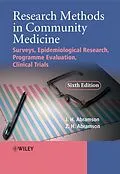* A simple and systematic guide to the planning and performance of investigations concerned with health and disease and with health care
* Offers researchers help in choosing a topic and to think about shaping objectives and ideas and to link these with the appropriate choice of method
* Fully updated with new sections on the use of the Web and computer programmes freely available in the planning, performance or analysis of studies
Autorentext
J.H. Abramson, Emeritus Professor of Social Medicine, The Hebrew University-Hadassah School of Public Health and Community Medicine, Jerusalem.
Author of five previous editions of the formerly titled Survey Methods in Community Medicine and Making Sense of Data with OUP.
Z.H. Abramson, Beit Hakerem Community Clinic (Clalit Health Services) and Department of Family Medicine, The Hebrew University-Hadassah School of Medicine, Jerusalem.
Klappentext
This is the sixth edition of Survey Methods in Community Medicine, which has established itself as a standard guide to the design, conduct, and analysis of studies concerned with health, disease, and health care.
It is written for students and practitioners of community medicine and public health (epidemiologists, family physicians, nurses, health educators, administrators, and others) who are interested in planning investigations of groups and populations, such as health surveys, cohort studies, comparisons of cases and controls, prophylactic and therapeutic trials, and other epidemiological and evaluative research. The book may also be helpful to non-researchers who wish to enhance their capacity for the judicious appraisal of medical literature.
It is a step by step guide to the design, conduct and analysis of these studies, and assumes little prior knowledge, but has copious notes and references for the benefit of readers who wish to learn more.
This edition has been revised and updated throughout, with the addition of -
- A new chapter on the use of the Web in health research.
- A guide to free computer programs for use in the planning, performance, and analysis of studies.
Inhalt
Preface vii
1. First steps 1
2. Types of investigation 13
3. Stages of an investigation 35
4. Formulating the objectives 39
5. The objectives of evaluative studies 49
6. The study population 61
7. Control groups 69
8. Sampling 77
9. Selecting cases and controls for case-control studies 91
10. The variables 101
11. Defining the variables 109
12. Definitions of diseases 117
13. Scales of measurement 125
14. Composite scales 133
15. Methods of collecting data 143
16. Reliability 151
17. Validity 161
18. Interviews and self-administered questionnaires 179
19. Constructing a questionnaire 193
20. Surveying the opinions of a panel: consensus methods 203
21. The use of documentary sources 209
22. Planning the records 225
23. Planning the handling of data 233
24. Pretests and other preparations 241
25. Collecting the data 247
26. Statistical analysis 251
27. Interpreting the findings 259
28. Making sense of associations 269
29. Application of the study findings 297
30. Writing a report 305
31. Rapid epidemiological methods 313
32. Clinical trials 325
33. Programme trials 345
34. Community-oriented primary care 357
35. Using the Web for health research 373
Appendix A Community appraisal: a checklist 383
Appendix B Random numbers 387
Appendix C Free computer programs 389
Index 407
